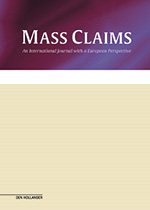Standing in collective environmental claims: the quest for normative consistency towards representation
Rhonson Salim1Collective environmental claims straddle the protection of two interests - the diffused and the individual. Given the duality of interests involved, the representative element in standing criteria take on greater significance in such claims. This article critiques the current approach towards representation in collective environmental claims before selected domestic and international courts. The article draws on perspectives from philosophy and political science to advocate for a novel (re)conceptualisation of representation in these claims. With a new conceptual foundation established, the article proposes standing criteria which should be used to assess representation in such claims.
1. Introduction
In most forms of collective claims, the procedural rights and obligations of the claimant party is granted to an entity who acts as a representative on behalf of a group or class. Collective environmental claims involve the simultaneous protection of b...
U heeft op dit moment geen toegang tot de volledige inhoud van dit product. U kunt alleen de inleiding en hoofdstukindeling lezen.
Wanneer u volledige toegang wenst tot alle informatie kunt u zich abonneren of inloggen als abonnee.


